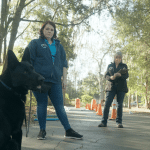The 4th of July celebrates the freedom and independence that our veterans fight for, but for some of them, the holiday can be a very difficult day. Loud, sudden blasts and explosions that accompany fireworks can cause high anxiety, flashbacks and bring back strong, traumatic memories of war.
(more…)
When Guardian Angels goes into a shelter, we look for a medium to a large-sized dog because they have to be able to do various tasks, and a small dog is not size appropriate. A correct service dog needs to always have four on the floor to support its recipient, so a larger dog doesn’t get stepped on as easily in a crowd. (more…)
Nancy Dakin started working with Guardian Angels Medical Service Dogs in the fall of 2020. First as a volunteer, then as a full-time employee in December 2021. She most recently joined the Development Team in 2022 and splits her time as a dog trainer and development project administrator for Guardian Angels. (more…)
Oliver was paired with Dash in July of 2020. Oliver has a chronic sleep disorder that disrupts his sleep-wake cycle and made each day feel unpredictable and overwhelming. (more…)
The difference between the various groups of dogs out there, such as service dogs, assistance dogs, emotional support dogs, and therapy dogs can be very confusing. To help people understand the difference between service dogs and therapy dogs, Guardian Angels Medical Service Dogs has put together an informative article to help people better understand the differences.
What is a Medical Service Dog?
Service dogs, medical service dogs, and assistance dogs, which are all the names for the same thing, are the only type of dog that is protected by federal law under the Americans with Disabilities Act (ADA). Since they are federally protected, they are permitted to have public access privileges. No other type of dog, including therapy dogs, has this privilege.
Service dogs are protected by federal law because they are much like medical equipment- but with a heartbeat. They are permitted to go anywhere the public is allowed to go. This includes places such as:
- Public transit
- Grocery stores
- Movie theaters
- Malls
- Hotels
- Concert venues
- Restaurants
- And more
Because service dogs are not considered to be pets in any way, shape, or form, they do not fall under any pet regulations. For example, if a grocery store, hotel or apartment has a no pet policy, this will not apply to a service dog. A service dog is more like medical equipment and not a pet, so under the law, you can’t charge someone extra or deny someone service due to them having a cane or a wheelchair or a medical service dog.
What is a Medical Service Dog Trained to Do?
Medical service dogs are trained to perform a variety of special tasks that are used to mitigate the challenges presented by a disability for an individual. Many of the people we deal with at Guardian Angels have been self-isolated at home for years or have caregivers and are unable to enjoy major life functions independently. A medical service dog is highly trained and can help the recipient in ways that not even a caregiver can.
Some of the ways a service dog can assist their recipient include but are not limited to:
- Alerting the recipient if their sugar levels are too high or too low
- Alerting their recipient in advance if they are going to have a seizure, a nightmare, a flashback, a panic attack, etc.
Service dogs have the ability to do these amazing tasks due to their incredible sense of smell, allowing their recipient to begin to function in a more normal way. The recipient relies on their medical service dog to do these things. Additionally, we also train mobility dogs who can pick up dropped items, turn on/off lights, open/close doors, and perform an array of other activities.
At Guardian Angels, our Service Dogs are put through no less than 1,500 hours of training over a year and a half to two and a half years. This extensive training includes basic and advanced commands, desensitization, socialization, and public access training. They also learn to ignore loud sounds, horns, sirens, other dogs, etc.
What is a Therapy Dog?
Unlike service dogs, therapy dogs are considered pets. Therapy dogs are trained to provide affection and comfort to people in places such as retirement homes, nursing homes, schools, hospitals, disaster areas, and hospices. They are amazing at cheering up patients and putting smiles on the faces of staff and patients alike, and at Guardian Angels, we salute them!
Legitimate therapy dog handlers put their therapy dogs through a good deal of obedience training and socialization exercises to ensure visits to places like hospitals are friendly and positive for the patients and the dogs.
As mentioned above, therapy dogs are still considered pets, so they have no special rights under the law and are not granted any special access to public areas. In most cases, they are required to have a special Therapy Dog Certification, but this still does not provide them with any public access privileges like a medical service dog.
Have Questions About Service Dogs? We’re Happy to Help!
If you have questions about the difference between therapy dogs and service dogs, feel free to contact us today to learn more!
Mary Lamparter serves as the Advisory Council Co-Chair- Michigan for Guardian Angels. She has worked with Guardian Angels as a volunteer for nine years. She began her journey at Guardian Angels with the event Celebrate Michigan’s Military that she still holds.
She has now also become the Regional Coordinator in Michigan, the chair of the Advisory Council, developed a group called Ambassadors, and is also the liaison between Michigan recipients and various events that she holds and attends on behalf of Guardian Angels.
Mary’s Motivation for Working with Guardian Angels
Mary said her “why” for being involved with Guardian Angels is because she knows that fundraising enables Guardian Angles to pair more Veterans and First Responders who desperately need help. She said she is here because she is a networker and has been successful in fundraising for and educating about Guardian Angels. She said she never served in the military, so working with Guardian Angels is her way of serving those who have served our country.
She said she is constantly touched by the stories our recipients share. Personally, Mary said she has been responsible for introducing at least two recipients to Guardian Angels when they had never considered a service dog before. She said after learning their story, she was able to suggest they might like to look into applying; both have been paired. Each of these individuals were friends and/or personal acquaintances of Mary’s, and she said she was thrilled that she could play a role in giving them a New Normal.
What Mary Wants You to Know About Guardian Angels
Mary said she constantly meets people who don’t know anything about Guardian Angels, and the first thing she tells them is that “We Save Lives.” With almost 400 dogs paired in 11 years, we’ve never experienced a suicide among our recipients.
Shonda was paired with Jack in February of 2020. Shonda suffers from night terrors. (more…)
Guardian Angels won the 7th Annual Veterans Award for Suicide Prevention from the Academy of the United States Veterans (AUSV) for their work with veterans and suicide prevention for the second year in a row! The award is not just for the service dog industry; it’s for all for-profits and non-profits that help veterans. (more…)
At Guardian Angels Medical Service Dogs, all the dogs go through the same training. But depending on whether it is a dog from our breeding program or a rescue dog, sometimes different things show up during training, and we never force a dog to do something it doesn’t want to do. (more…)





